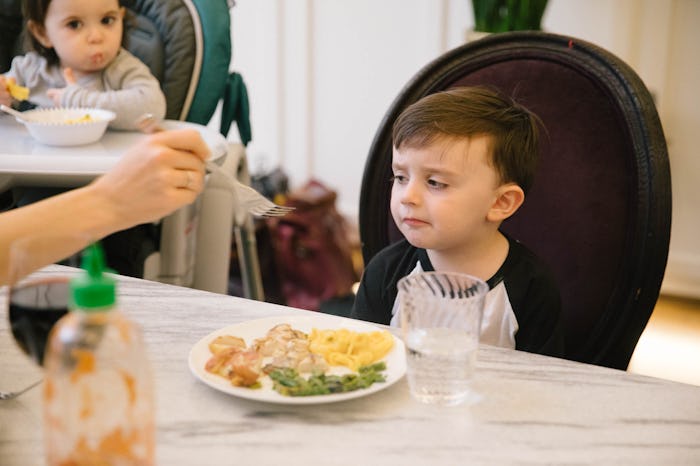Life
Real Families Give Advice for Sending Your Child With A Food Allergy To School
When your child heads off to school, you relinquish a lot of the control and guidance you have in their day-to-day life... which, depending on the day, may feel either relieving or saddening. For a parent of a child with food allergies, school lunches and classroom snacks can be particularly anxiety-provoking. While your kitchen at home is clear of those pesky allergens, you can't really expect their school (and every lunchbox) to be. So here's how to talk to your kid about allergies before you send them back to school, according to real families who have dealt with the same thing.
It's completely understandable why moms of kiddos with allergies might be uneasy. After all, you know exactly what your child can and can't have, and have been accommodating your child's allergy for years. You've likely also seen what an allergic reaction can look like, whether it's life-threatening or simply itchy and irritating. But because you can't be your child's protector while they're at school, it's crucial to teach them to be their own.
One of the best things you can do for your child with food allergies is to teach them to use their voice, ask questions about their food, and remind grown-ups and classmates what they cannot have. For the family of 5-year-old Sky, who suffers from oral allergy syndrome, teaching her to say 'no' to certain foods wasn't too difficult. "She is weirdly perceptive about this stuff. She remembers pretty much any fruit that she's had a reaction from and avoids it herself mostly," says Morgan Lewis, Sky's aunt, to Romper. "We've always talked to her like an adult. We just explained what an allergy is, and why she has a reaction. She does the hard part of saying 'no' to what she shouldn't eat, which is awesome."
It turns out, kids even younger than Sky can learn about what they can and can't eat. Leah Padlo, stepmom to a 3-year-old with a dairy allergy, is amazed by how easily her stepdaughter can identify and avoid foods. "She knows the difference between the lactose-free milk and the normal milk. She knows she can’t have cheese and she can’t have chocolate. She is only in preschool so she doesn’t have much choice in her food, but when we go to the gas station or something she always says, 'Daddy said no chocolate,'" Padlo tells Romper.
Of course, kids will be kids, and inevitably they'll be tempted to eat a "forbidden" food once or twice. Sometimes they simply might not know if a food contains an allergen. It's crucial to prepare your child in the case of an allergic reaction, as well as alert teachers and school administrators of their allergy and allergic reaction symptoms.
"Make sure they are prepared for the worst case scenario. Have your child carry an EpiPen and know how to use it. Many EpiPens come with trainers made for teaching how to administer it properly and can be useful when teaching your child or the teachers," Kelsi Buckley, registered dietician at a specialty pediatric outpatient clinic, tells Romper. "Make sure the allergy is acknowledged by the teacher, nurse, and cafeteria staff, and what signs and symptoms to look for to determine if the child is having a reaction."
Beth Shields, whose severe food allergy developed as a child and got worse over time, is grateful for her parents for their approach to her allergies as she aged. "I think what was most helpful was that they empowered me to check out the menu and figure out for myself what I could and couldn't eat, rather than just doing it for me," Shields tells Romper. While it might be tempting for parents to micromanage dietary restrictions and allergies, older children should be taught to make their own healthy choices.
As an adult, it's easy to forget how it is to be a child who feels "different" from your classmates. Sadly, food allergies have the power to make kids feel alienated, particularly during special occasions involving food. Autumn Pressley, who grew up with a severe allergy to gluten, encourages parents to make their child feel special, rather than different. "It was tough when every kid celebrated a birthday and all the kids got cupcakes or cake, while I got a weird, triangle-shaped, gluten-free brownie that my mom sent with me to school," Pressley tells Romper. "My advice to parents with children who have allergies in elementary school is to make your kid feel like they are special, and make their treat even better than all the other kids' rather then making them feel like they are weird."
Sending your child off to school can be nerve-wracking, and it can be even worse when you've got a fear of an allergic reaction in the back of your head. By empowering your child and informing their school, you'll ensure that the transition goes smoothly.
